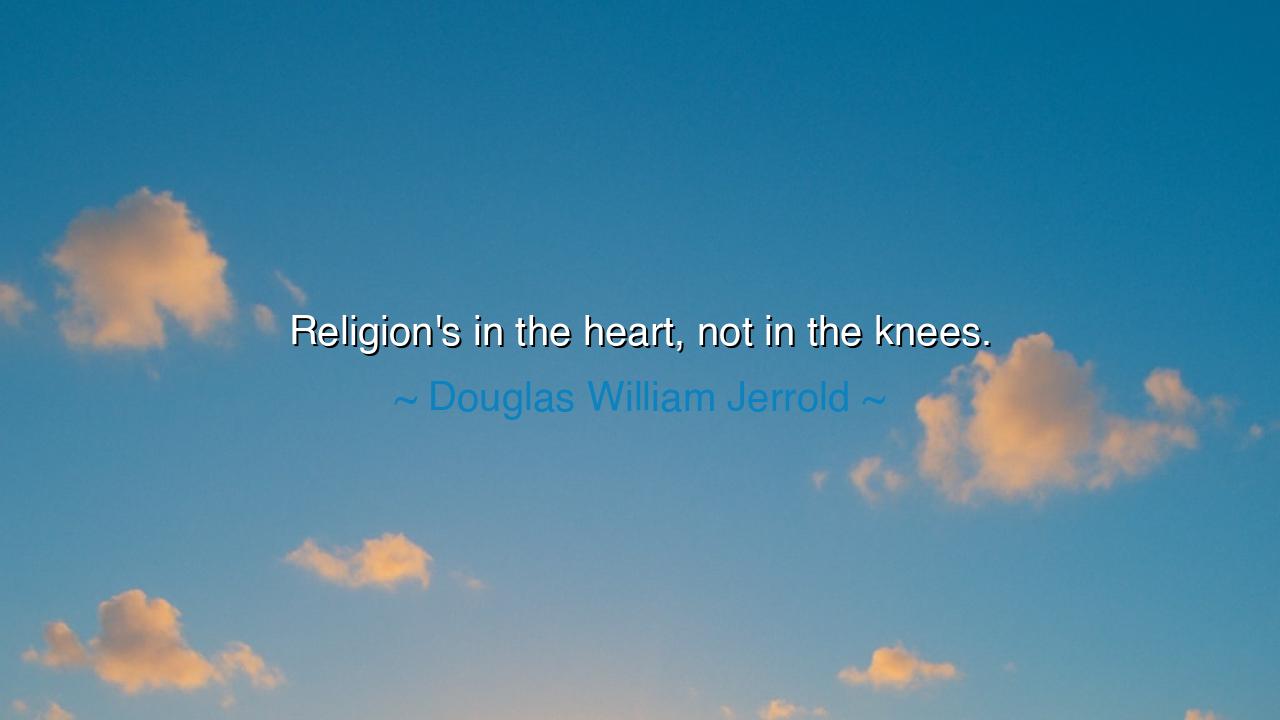
Religion's in the heart, not in the knees.






“Religion’s in the heart, not in the knees.” Thus declared Douglas William Jerrold, the English dramatist and wit of the nineteenth century, whose humor often cloaked the deepest truths of the human spirit. In this short and piercing phrase, Jerrold reveals an eternal distinction between outward devotion and inward faith—between the mere posture of piety and the living fire of the soul. To bend the knees is easy; it is an act of the body. But to open the heart—that is the act of the spirit, the true offering to the Divine. Jerrold’s words rise like a quiet thunder against the hollow worship of appearances, reminding us that true religion is not measured by ritual or gesture, but by the sincerity of love, compassion, and humility that dwell within.
When Jerrold says that religion is in the heart, he speaks of that inner sanctuary where the soul communes directly with truth. The knees may bend in prayer, but the act is empty unless the heart itself bows in reverence. Throughout history, mankind has mistaken the symbol for the substance—building temples while neglecting the spirit, repeating prayers while forgetting the meaning of mercy. Yet the divine does not dwell in the motions of the body, nor in the sound of ritual, but in the intent that moves them. The heart, pure and contrite, is the true altar; love, forgiveness, and integrity are its offerings. Thus, Jerrold’s wisdom calls us back to the source—to worship not through form, but through feeling and truth.
The origin of this insight lies in Jerrold’s age—a time when society was full of moral pretense, where religion was often more ceremony than conscience. He, being a satirist, observed how men knelt in churches but rose to deceive their fellow men in the marketplace; how they spoke of virtue in public but lacked charity in private. His words, though sharp, were born of compassion. He saw that the soul of faith had been buried under custom, and that what was meant to liberate had become routine. In this sense, his quote stands as both rebuke and reminder—rebuke to hypocrisy, and reminder that the divine seeks no performance, only sincerity.
To understand this truth, one might remember the story of St. Francis of Assisi, who forsook wealth, privilege, and comfort to live among the poor. Though he prayed often, his prayers were not the measure of his holiness—it was his heart. He saw God in the wounded, the outcast, the leper. His religion was not in grand cathedrals or intricate ceremonies, but in the simple acts of love that healed and uplifted others. St. Francis lived Jerrold’s teaching centuries before it was spoken: his religion was in his heart, not his knees. He showed that prayer without love is hollow, but love itself is the purest prayer.
Jerrold’s words also remind us that faith without compassion is a lifeless thing. Many have knelt before altars but risen to despise their neighbors. Many have recited prayers but refused to forgive. To such souls, the poet’s warning is clear: the Divine hears not the murmur of the lips, but the cry of the heart. To love one’s fellow man, to show kindness where it costs something, to lift another’s burden—these are the true acts of worship. For what good is kneeling before heaven while turning one’s back on the suffering of the earth? The heart, not the knee, bridges the distance between man and God.
The lesson is thus one of authenticity. Let your faith be not a habit, but a living truth. Do not measure your spirituality by how often you kneel, but by how deeply you love, how honestly you live, and how readily you forgive. True religion is not bound by place or posture—it can be found in the silence of the soul, in the kindness of a word, in the courage to do what is right. If your heart is filled with compassion, then even your silence is prayer. If it is filled with hatred or pride, then even your loudest devotion is noise.
So, my child of both reason and spirit, remember the wisdom of Douglas William Jerrold: “Religion’s in the heart, not in the knees.” Let your faith be more than motion; let it be meaning. Bend your knees if you must, but only after your heart has bowed. Seek not to appear holy, but to be whole. For the God who made heaven and earth does not dwell in temples of stone or rituals of habit, but in the humble, loving, truthful heart of every human being. Live from that sacred place, and every act, no matter how small, will become a prayer—offered not from the knees, but from the soul itself.






AAdministratorAdministrator
Welcome, honored guests. Please leave a comment, we will respond soon